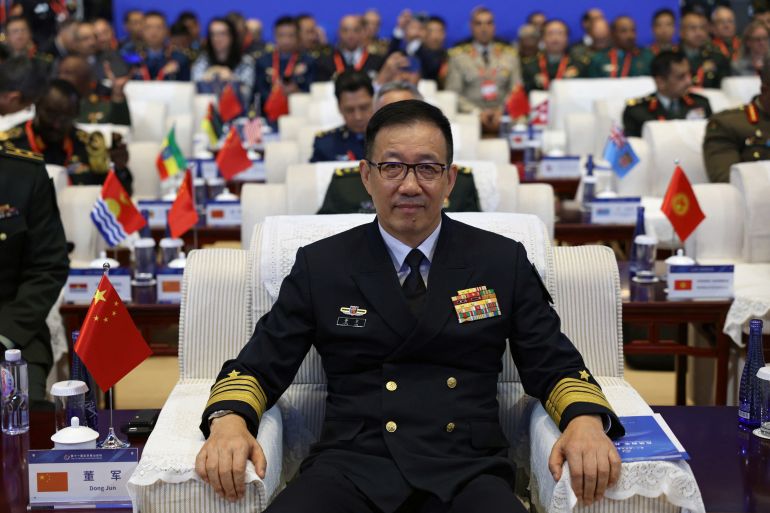Singapore – Of the many military officials darting across the lobby of Singapore’s Shangri-La Hotel this weekend, there has been one significant absence.
China’s Defence Minister Dong Jun skipped the annual Shangri-La Dialogue, Asia’s premier security forum, with Beijing sending a delegation of lower-ranking representatives instead.
It was the first time since 2019 that China has not dispatched its defence minister to the high-level dialogue on regional defence, except when the event was cancelled in 2020 and 2021 due to the COVID-19 pandemic.
Beijing’s decision raised eyebrows in Singapore, coming at a time of heightened tensions between China and the United States – the world’s two biggest superpowers.
Dong’s absence meant there was no face-to-face meeting with his US counterpart, Secretary of Defence Pete Hegseth, who had the floor to himself on Saturday when he told the defence forum that the military threat posed by China was potentially imminent.
“It has to be clear to all that Beijing is credibly preparing to potentially use military force to alter the balance of power in the Indo-Pacific,” Hegseth told delegates in Singapore.
Pointing to China’s regular military drills around Taiwan as well as increasingly frequent skirmishes in the South China Sea, Hegseth said Beijing was proactively harassing its neighbours.
“There’s no reason to sugar-coat it. The threat China poses is real, and it could be imminent,” Hegseth said.
He also pointed to China’s growing military assertiveness as a reason for Asian nations to boost their defence spending, pointing to Germany, which has pledged to move towards spending 5 percent of its gross domestic product (GDP) on defence.
“It doesn’t make sense for countries in Europe to do that while key allies in Asia spend less on defence in the face of an even more formidable threat,” Hegseth said.
The defence chief also looked to reassure Asian allies that Washington was committed to Asia Pacific security despite strained ties in recent months as US President Donald Trump targeted some close allies with hefty trade tariffs.
“America is proud to be back in the Indo-Pacific, and we’re here to stay,” he said, opening his speech.
Some analysts were quick to play down the severity of Hegseth’s warnings about China.
“Short of a very few countries, not many in this part of the world see China as an imminent threat and would up their [defence] spending,” said Dylan Loh, assistant professor in the public policy and global affairs programme at Singapore’s Nanyang Technological University.
China tight-lipped on defence chief’s absence
In previous years, the Shangri-La Dialogue had provided a rare platform for meetings between Chinese and US officials in the more informal surroundings that the summit could offer.
The structure of the schedule also allowed Beijing’s military chiefs to directly respond to the keynote speech from the US defence secretary and to present their narrative to other members of the Asia Pacific.
Beijing has remained tight-lipped on the reason for Defence Minister Dong’s absence from the forum, fuelling an information void that has been filled by speculation.
One theory is that China did not want to send a high-profile delegate to the event at such a sensitive time as Beijing navigates the tariff war with the Trump administration.
“Any sort of faux pas or comments that may go off script can be picked up and picked apart or misconstrued,” said Loh, of Singapore’s Nanyang Technological University.
“So the question is why take the risk when US-China relations are at a very delicate point at this moment,” Loh told Al Jazeera.

The Shangri-La Dialogue weekend has not always been the easiest occasion for Chinese defence ministers. In recent years, they have faced difficult questions from their counterparts in other countries, who are unhappy with Beijing’s increasing assertiveness in the Asia Pacific region.
Loh said this could be another factor in Dong’s absence from the high-profile event.
“Any Chinese defence minister coming to Singapore now will be exposing himself and the country to political risk,” he said. “Themes like the South China Sea and possibly Taiwan will emerge, which makes China a convenient target,” Loh added.
Dong was appointed as China’s defence minister in late 2023, after his predecessor, Li Shangfu, was removed from office.
Less than a year into the job, there was speculation surrounding Dong’s new position following media reports that he was under investigation as part of a wider investigation into corruption in the Chinese military. Beijing denied the reports, with the minister continuing to maintain a public profile despite the allegations.
There has also been intense scrutiny of China’s military, following reports of an apparent purge of top-level officials by President Xi Jinping.
One of Beijing’s most senior generals, He Weidong, was missing from a high-profile political meeting in April, adding to rumours surrounding a possible restructuring in the People’s Liberation Army (PLA).
Ian Chong, a nonresident scholar at the Carnegie China research centre, said such speculation could be a factor in Dong’s no-show in Singapore.
“Because of the domestic turmoil with China’s senior military, they perhaps don’t want to, or the PLA itself feels that it’s not in a position to send somebody senior,” Chong told Al Jazeera.
Announcing Dong’s absence at a news conference before the summit, Chinese military spokesperson Senior Colonel Zhang Xiaogang maintained that communication channels were still open between defence officials in Washington and Beijing.
“China places great importance on US-China military ties, and is open to communication at different levels,” Zhang said.
